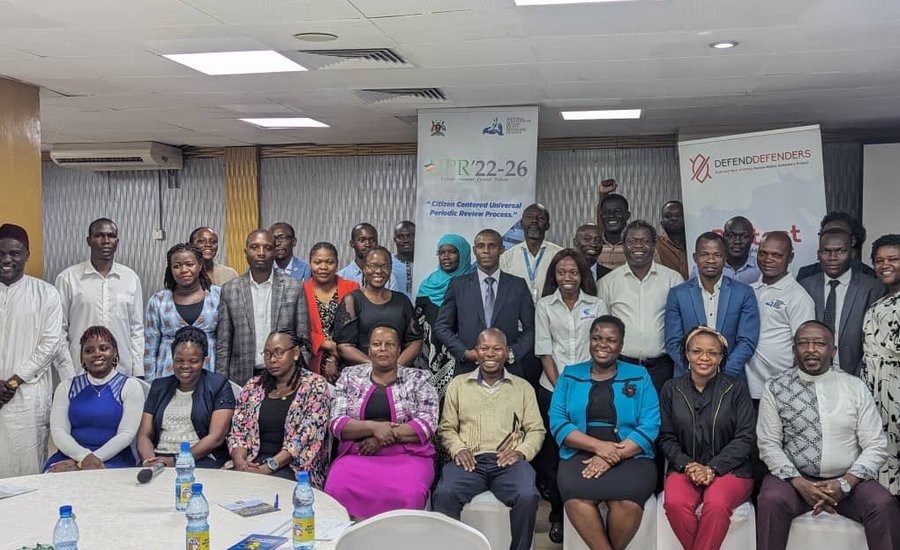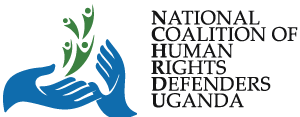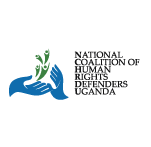- April 2, 2024
- Posted by: hrdcoalitionAdmin
- Category: News Updates

The National Coalition of Human Rights Defenders Uganda (NCHRD-U) with support from Defend Defenders convened a significant civil society organization mid-term Universal Periodic Review (UPR) conference, marking a pivotal moment in the Uganda’s ongoing commitment to UN human rights council recommendations. The two days conference, held at Hotel Africana in Kampala from 27th to 28th March, 2024, brought together a diverse array of stakeholders, including government representatives, human rights defenders, civil society organizations and legal experts. The conference was held under the theme; “Citizen Centered Periodic Review Process”.
The Universal Periodic Review is a unique mechanism under the support of the United Nations Human Rights Council, designed to assess the human rights records of all UN member states. Uganda, like other participating countries, undergoes periodic reviews of its human rights situation, with recommendations made to improve on the general situation of human rights in the country.
During the two days conference, participants engaged in rigorous discussions and evaluations of Uganda’s progress in fulfilling its human rights obligations since its last review cycle. Key issues such as access to justice, role of CSO vis-a vis state role in the mid-term review, freedom of expression, the importance of mutual collaboration with civic society on the improvement of UPR recommendation, gender equality and sharing experiences and good practices were among the focal points of the deliberations.
Ms. Margaret Sekaggya the former UN Special Rapporteur and Board Chairperson of the NCHRD-U appreciated the collaboration of civil society in sharing information on the UPR process.
“I appreciate the fact that civil society has been able to collaborate well with both State and non-state actors in terms of sharing information on the UPR processes. Some of the leading actors have been Office of the High Commissioner for Human Rights (OHCHR) (before it exited Uganda). The other crucial institutions have been Uganda Human Rights Commission; Equal Opportunities Commission; Ministry of Foreign Affairs; Ministry of Justice and Constitutional Affairs; the Justice, Law and Order Sector; Uganda Police Force; Uganda Prisons Service; NGOs like NCHRD-U; DefendDefenders, Human Rights Centre Uganda, Chapter Four Uganda, Initiative for Social and Economic Rights (ISER); Foundation for Human Rights Initiative; Lutheran World Federation; UPR Info, the media; among others” she noted.
Representatives from various thematic clusters presented reports, highlighting both achievements and areas requiring further attention. Civil society organizations played a particularly vital role in offering grassroots perspectives and advocating for meaningful reforms to address systemic challenges.
In addition to assessing past performance, the conference served as a platform for charting future strategies and priorities for advancing human rights in Uganda. Participants emphasized the importance of concerted efforts involving government, civil society, and other stakeholders to effect positive change and ensure the protection of fundamental rights for all Ugandans.
Mr. Bernard Mujuni, the commissioner of equity and human rights at the Ministry of gender, labor and social development was one of the representatives from government who participated in the conference. He noted that, government is willing to generate its own mid-term report to see how it is progressing. He encouraged civil society organizations to share the UPR report since it is no longer referred to as a shadow report but rather an alternative report.
The conference concluded with a renewed commitment from all stakeholders to work collaboratively towards the realization of a more just, equitable, and rights-respecting society. Recommendations and action plans stemming from the discussions will be instrumental in guiding Uganda’s UPR report.
As Uganda continues its journey towards upholding human rights standards and principles, events like the mid-term Universal Periodic Review conference play a crucial role in fostering transparency, accountability, and dialogue among all sectors of society. By confronting challenges head-on and embracing constructive dialogue, Uganda’s CSOs reaffirms its commitment to promoting and protecting the inherent dignity and rights of all its citizens.
About Uganda’s engagement in UPR.
Uganda’s engagement with the UPR commenced with its initial review in 2011, where it received recommendations from various UN member states and stakeholders regarding its human rights situation. Subsequent cycles, in 2016 and most recently in 2021, saw further scrutiny of Uganda’s human rights record, with additional recommendations aimed at addressing persistent concerns and challenges. As Uganda now approaches the mid-term review phase following its 2021 UPR, there is a heightened focus on assessing the progress made in implementing accepted recommendations and addressing ongoing human rights issues. An increasingly significant aspect of the UPR process is the submission of midterm reports by states and other stakeholders involved in the UPR process. Highlighted in HRC Resolution 16/21 “Review of the Work and Functioning of the Human Rights Council,” the provision encourages states to provide voluntary midterm updates on the follow-up to accepted recommendations. Midterm reports play a crucial role in assessing the progress made by states towards implementing UPR recommendations. The preparation process for these reports involves extensive consultations with various stakeholders, including line ministries, state entities, local and regional governments, national human rights institutions (NHRIs), civil society organizations (CSOs), and the UN system. Midterm reports offer an opportunity for stakeholders to reflect on the implementation status, identify challenges, and explore opportunities for further action. They facilitate accountability, promote coordination at the national level, and provide a platform for showcasing efforts taken towards UPR implementation, such as advocacy, institutional development, and strategy formulation.

